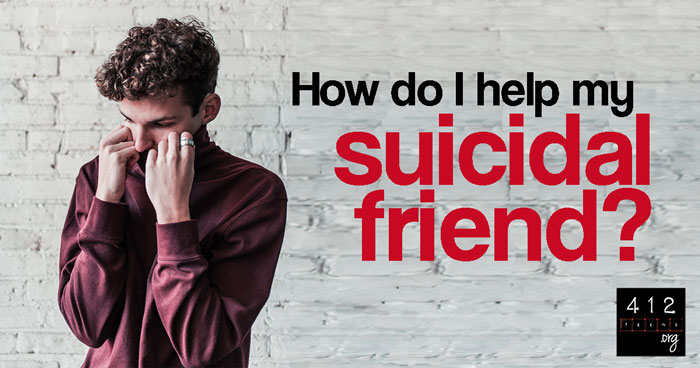What should I do if my friend/loved one is suicidal?

CW: Suicide, Mental Health Disorders, Depression
According to the National Institute of Mental Health (NIMH), suicide rates have jumped 28% between 1999 and 2016. But for many of us, we don't need a statistic to tell us how bad the suicide epidemic is. We've lost friends or family to suicide or have had close experiences with someone we love struggling with thoughts of suicide.
When a loved one confides in us that they're struggling with suicidal ideation there are many emotional responses we could experience: shock, hurt, anger, sheer terror for our friend's life. The next response is likely to be, "How do I respond?" and "How can I help?" Suddenly, we feel like we're walking on eggshells with our loved one and a single mistake can mean life or death.
Your loved one is in a lot of pain, and it's so easy to get wrapped up in a tizzy over right or wrong decisions, but there is one very important truth that must be kept at the forefront of your mind:
You are not responsible for their decisions.
In the end, no matter how well you do or don't support your friend or loved one, it will be up to them if they accept help, pursue mental health care, or ignore the lifelines and continue going to a dark place. It feels like their life is in your hands, but it's not. You are only responsible for doing the best you are able with what you have, and the end result is entirely up to that person and God's sovereignty.
That may sound scary, but God's creativity expands beyond our ability to comprehend. He knows far better how to care for that person than we ever will, and He cares about them deeper than we ever can.
"Are not two sparrows sold for a penny? And not one of them will fall to the ground apart from your Father. But even the hairs of your head are all numbered. Fear not, therefore; you are of more value than many sparrows." —Matthew 10:29-31
With that stated, there are ways you can support your loved one that are generally agreed upon by mental health professionals, plus we need to debunk some myths right off the bat.
First: Talk to Your Friend
To admit you're suicidal to another person takes a lot of courage. Many suicidal people are already crushed under loads of shame for feeling suicidal in the first place. There's a heavy stigma in American culture (and other cultures as well) that we don't have it "bad enough" to struggle with suicidality. There are other relational stigmas of angering friends or families for being selfish or ungrateful for what we have.
Others may have seriously deep and severe trauma that leaves them feeling alone and like their pain has no place to be understood or validated. From brain chemistry to family history to stress to trauma and more, there are so many reasons for a person to find themselves in soup of suicidal thoughts that it's important not to assume we know what they're going through.
Instead of assuming, talk to them. Do your best not to be judgmental or angry. Avoid phrases like, "Why would you want to die?" or, "You have so many friends," or, "Suicide is really selfish," or, "You really want to hurt everyone who loves you like that?" Those phrases invalidate the honest emotions and pain they're experiencing.
Alternatively, ask them, "How long have you been feeling like this?" or, "Did something specific happen to trigger these feelings?" Ask open-ended questions and really listen if they can respond. Ask them how you can support them. Be prepared that they might not be ready or able to answer.
Second: Evaluate Their Risk Level
Another thing to ask your friend is if they have a suicide plan already in place. Is there a specific way they've been fantasizing about suicide? There's a myth that by asking a suicidal person for details, you will be planting ideas in their mind of how to hurt themselves. But a suicidal person's mind is already dabbling in that arena of thoughts and ideas; asking them this question isn't planting an idea, it's pulling a dark idea that's already there out into the light. If your friend does have a plan, then they're at a higher risk to follow-through and make an attempt.
Keep an eye on your friend's behavioral patterns. Are they starting to talk more and more about dying? Do you notice that they're lingering near objects or topics they could use to hurt themselves?
If you think your friend is a danger to themselves, stay with them if possible. Err on the side of caution: call 911 or call a crisis hotline. If you need to call a parent to help you drive them to the ER, do so.
Third: Encourage Them to Get Help
As good as a friend as you want to be, you're likely not in a place to offer professional advice for their specific situation. A professional will be better equipped to help your friend determine what the root of their suicidality is and how best to combat it. Remind your friend that there is no shame in getting help or looking into medication.
If they argue with you on that, and they are a believer, you can remind them that God has claimed our bodies as temples for the Holy Spirit and He directs us to glorify Him with our bodies (1 Corinthians 6:19-20). Part of glorifying God with our bodies is to take care of them. The brain is part of our body. If it's sick, then it's beneficial to seek healing for it.
Fourth: Build a Community
Your friend may ask you to keep their suicidality a secret. After all, like we've already mentioned, suicidality is a subject of deep shame for many people. But you cannot carry this burden by yourself; it's just too heavy. Find a responsible adult whom you deeply trust to get advice and guidance from; get their permission to contact them at any time—if you and your friend need help. This could be a parent, a pastor, a guidance counselor, or any other trusted adult in your life.
Finally: Love Them
"And we urge you, brothers, admonish the idle, encourage the fainthearted, help the weak, be patient with them all. See that no one repays anyone evil for evil, but always seek to do good to one another and to everyone. Rejoice always, pray without ceasing, give thanks in all circumstances; for this is the will of God in Christ Jesus for you." —1 Thessalonians 5:14-18
There are many different people who struggle with diverse issues, and each of these issues has its own biblical directive from the apostle Paul in how to love those people better.
Encourage your friend, help them, be patient with them. Remind them that they are not alone, even if they can't believe you in that moment—or day or week or month. Remember that they are in the hands of a loving God who sees each fracture of their broken heart.
ALSO SEE:
- What does the Bible say about suicide?
- What are the signs of suicidal ideation?
- How do I survive thoughts of suicide?
- Why should I not choose suicide?
- How do I cope with the loss of a friend to suicide?
- Will a Christian who dies by suicide go to Heaven?

Suicide Prevention: Seek Help Now
- Call 988 or text HOME to 741741 (US only)
- 988 Hotline (call, text, chat, deaf/HOH, y en espanol)
- Find a Helpline (International)
- National Hopeline Network: 1-800-SUICIDE
- National Child Abuse Hotline: 1-800-4-A-CHILD
- National Domestic Violence Hotline: 1-800-799-SAFE
- Rape, Abuse, and Incest National Network (RAINN): 1-800-656-HOPE
- The Trevor Project: 1-866-4-U-TREVOR


TL;DR
Many of us have lost friends and loved ones to the suicide epidemic. A loved one confiding their suicidal thoughts and temptations to us is a heavy burden, but not one we need to bear alone. At the end of the day (or moment), we aren't responsible for our friend's decisions and thoughts. God sees and loves them and values them infinitely (Matthew 10:29-31). 1: Talk to your friend; be patient and nonjudgmental; gently ask how long they've felt suicidal. 2: Evaluate their risk level; see if they have a suicide plan. If you believe your friend's in danger, call 911 or a crisis hotline. 3: Encourage them to get professional help. Taking care of mental health problems is part of caring for and glorifying God with our bodies (1 Corinthians 6:19-20). 4: Build a community. Find a responsible adult you trust to help you and your friend. 5: Love your friend, be patient, be encouraging, help them the best you can (1 Thessalonians 5:14-18). Remember that they are in the hands of a loving God who sees, knows, and values them.

Writer/Editor: September Grace
September is an avid film nerd from growing up on weekend trips to Universal Studios Hollywood. She is passionate about the intersections of Christian spirituality, faith, and storytelling in popular culture. Outside of 412teens and digging up obscure horror flicks from the 2000s, she works as a freelance developmental editor and acquisitions consultant while comforting her clingy feline floof, Faust, from the anxiety of existence.
